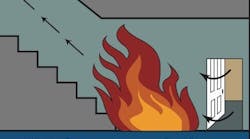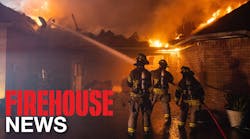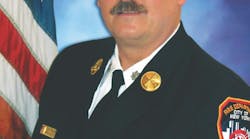And, that's where the battered FIRE Act seems to be. The bill that once proposed a five-year, $5 billion federal aid program for the nation's fire departments is now a shadow of its original self and caught in the partisan crossfire of an election year. It will take a political rapid intervention team to save it from oblivion before Congress adjourns.
You're all familiar with how it started out as the Fire Investment & Response Enhancement Act and was introduced in the House of Representatives by Rep. Bill Pascrell (D-NJ), with strong backing from all of the fire service organizations. But the House Republican leadership never liked the idea of a big-spending bill proposed by a Democrat. They kept it buried in the Science committee, despite a growing list of co-sponsors from both parties.
The fire organizations lobbied hard on Capitol Hill but, unlike the police - who get $7 billion in federal programs every year - there was no public support for the fire legislation. However, they finally managed to get a hearing before a House Transportation subcommittee, where fire service leaders testified on the need for federal aid. They got a lot of sympathy, but no action on the FIRE Act.
In an effort to get something for the nation's firefighters, Rep. Curt Weldon (R-PA) and Rep. Steny Hoyer (D-MD) drafted a one-year program that would provide $100 million in matching grants for fire departments. It passed the House and was sent on to the Senate as an amendment to a $12 billion emergency spending bill that covered a wide range of foreign and domestic projects.
But a funny thing happened when it reached the Senate. The powerful members of the Senate Appropriations Committee knocked out a number of measures they viewed as pork, including the $100 million in fire grants. Instead, they added their own pork-barrel projects. Sen. Ted Stevens (R-AK), the committee chairman, saw to it that Alaska got several big programs and Sen. Robert Byrd (D-WV), the ranking Democrat, got a new federal facility for Harpers Ferry. Almost everyone on the committee got something for their state, but there was no money for firefighters.
Meanwhile, a Senate version of the FIRE Act was introduced by Sen. Christopher Dodd (D-CT) and Sen. Mike DeWine (R-OH). In an effort to "broaden the appeal," they added a mandate that 10% of the funds must go to community organizations engaged in fire prevention programs. That would have taken $100 million away from fire departments each year and given it to organizations like SAFE KIDS, a coalition that prevents accidental injuries to children. Coincidentally, Dodd and DeWine are big supporters of SAFE KIDS.
Sen. John McCain (R-AZ), chairman of the Senate Commerce, Science and Transportation committee, held a hearing on the FIRE Act in July, but it was too late in the session for any real action to occur. Once again, the fire-rescue service got a chance to testify for a few hours, but no help.
Then Senator Dodd pulled a really slick maneuver. He attached a watered-down, six-year, $3 billion version of the FIRE Act to the Department of Defense authorization bill. Dodd and the International Association of Fire Fighters (IAFF) were the only ones who knew about his ploy and, according to my sources, Dodd told the union not to say anything to anybody - even though they would need the help of Weldon and others to get it through the House-Senate Defense Authorization conference committee.
Everyone was caught by surprise. The House Republican leadership was furious and wanted to know why Weldon - the leading proponent of fire legislation - didn't know it was coming. Since the IAFF has endorsed Vice President Gore in the presidential races, they saw it as a Democratic plot to embarrass the GOP. The IAFF denies this was their motive and insists they were simply trying to get the bill moving. Weldon was furious that he had been blind-sided and embarrassed. An angry McCain threatened to kill the Dodd amendment in the conference committee.
In fact, everyone is mad at someone. At a meeting with the fire organization, Weldon unloaded on the IAFF for not informing him of Dodd's maneuver. The bipartisan effort that put together the Congressional Fire Service Caucus, led by Weldon, could be seriously weakened by this episode. But the fire organizations are determined to keep working together to pass a FIRE Act and still believe they have a chance to save it as time runs out.
Sen. John Warner (R-VA), chairman of the conference committee, has become the new power broker in this saga and his staff is rewriting a pared-down version of the FIRE Act. It would provide $2.1 billion over five years, with only 5% set aside for outside organizations engaged in fire prevention activities. Weldon - presumably with the backing of House Republican leaders - is proposing a six-year, $1.5 billion FIRE Act that incorporates a number of other fire-rescue programs in addition to the matching grants. Weldon also is working with Sen. William Roth (R-DE) to revive the $100 million Weldon-Hoyer program as an amendment to the Agriculture appropriation bill.
As this is written, only three weeks are left before the 106th Congress comes to an end and the members go home to campaign for their own re-election. The fate of what's left of the FIRE Act is in the hands of the "Big Four" - Sen. Warner, Sen. Carl Levin (D-MI), Rep. Floyd Spence (R-SC) and Rep. Ike Skelton (D-MO) - the powerful senior members of the conference committee. In the end, they will decide if it lives or dies.
I don't know what's going to happen. But the FIRE Act's tortuous journey has been a lesson for the fire-rescue service on how things work in Congress and how badly they need public support to get the federal aid they desperately need.
Hal Bruno, a Firehouse® contributing editor, is a retired political director for ABC News in Washington and served almost 40 years as a volunteer firefighter. He is a director of the Chevy Chase, MD, Fire Department and chairman of the National Fallen Firefighters Foundation.




